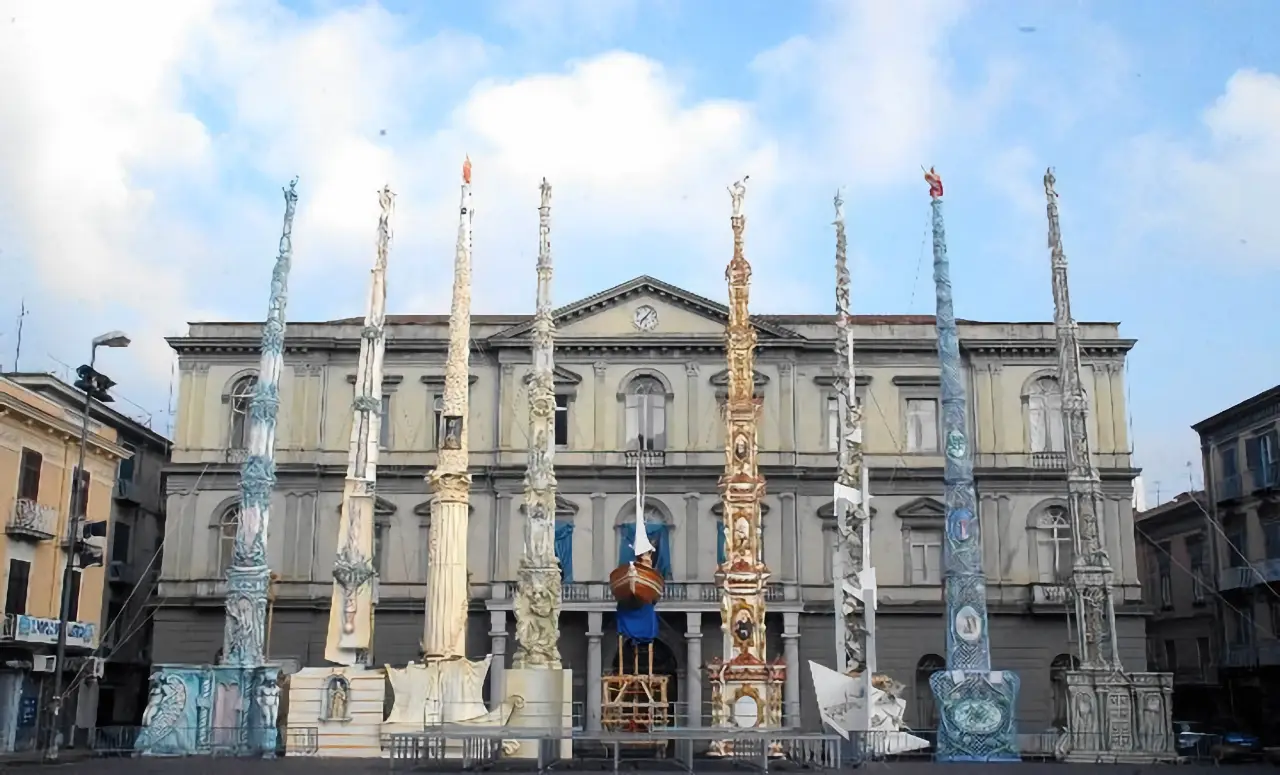WHERE: Nola, Italy
WHEN: June 30, 2024
Not far from the splendid Naples, in the small town of Nola, a festival of great charm and tradition takes place, in honor of San Paolino, protector of the city. A true celebration of the popular, folkloristic and religious tradition of the whole of Southern Italy!
It is said that in 410 AD, the then bishop Paulinus donated his possessions, and himself, to the Visigoths, in exchange for the liberation of the Nolans, who had been enslaved. When the bishop returned to Nola in 431, by ship, after years of imprisonment, he was welcomed by the inhabitants with flowers (lilies) and escorted to the bishop’s palace.
Hence, the birth of the Feast of Gigli in Nola. An event that generally occurs every year, on Sunday 22 June or the first Sunday following this date. The 2024 edition is an exception, postponed to June 30th to “avoid overlapping the Saturday demonstration of the committees and the procession of the silver bust of San Paolino“.
2013 marked the consecration of this event, with its inclusion in the UNESCO Oral and Intangible Heritage of Humanity. In addition to the reason for the organizers’ pride, it is an excellent excuse not to miss the event.
Photo ©, Michael LoCascio
PRACTICAL INFO
HOW TO GET TO NOLA
Nola is located just over 30 km from Naples. From Naples Capodichino international airport, with the ALIBUS bus (tickets for €5.00 can be purchased directly on the vehicle) you arrive at the Central Railway Station. From the latter, with the Circumvesuviana-EAV trains, NAPLES-BAIANO LINE, you can reach Nola in about 45′. The ticket for a single journey, called TIC NA3, costs €3.30 one way. The frequency of the trips is 30′.
THE GIGLI OF NOLA
The Gigli are wooden structures of fine workmanship, made by local master craftsmen, with decorations in stucco or other materials, according to religious, historical or current themes.
Each takes its name from one of the ancient arts and crafts guilds: Ortolano; Delicatessen; Drinker; Baker; Butcher; Shoemaker; Blacksmith; Tailor.
The 8 obelisks have the base of a cube, approximately 3 meters per side, and a height of 25 meters. They are lifted and maneuvered on the shoulders by 128 individuals, called cradles; the latter together constitute the so-called “paranza”.
In total there are 8 lilies, to which is added a similar but lower structure: the boat; it is a historical reference to the boat with which San Paolino returned to Nola.
THE QUESTUE
As mentioned, the Feast of Gigli in Nola is not limited to Sunday only. In fact, preparations last all year! In this sense, the Questue represent one of the most important events of the event, allowing the Masters of the Feast to collect donations to cover the expenses of their lily.
Before the offerings, the masters (who generally constitute a committee) organized large banquets in the presence of relatives and acquaintances. At the end of the banquet, the mystery begins to go around the tables to collect offerings.
The new festival masters, in order to reduce the costs of the entire event which they are responsible for, sometimes set up a committee, whose members ask for a contribution from local artisans and traders. A banquet is then held to which relatives and friends are invited. At the end of the lunch, the master of the party begins to go around the tables and thanks to those present, he manages to collect a certain sum of money which will allow him to bear the burdens he will have to bear.
Below is the official 2024 calendar of collections/presentations
- Giglio Del Bettoliere Corporation: 17 March
- Giglio Del Salumiere Corporation: 7 April
- Giglio Del Cozolaio Guild: 21 April
- Giglio Del Sarto Corporation: 27 April
- Giglio Del Fabbro Guild: 28 April
- Giglio Del Beccaio Corporation: 5 May
- Boat of San Paolino: 17 May
- Giglio Del Panettiere Corporation: May 25th.
THE SUNDAY OF THE HOLIDAY
The Feast of Gigli in Nola begins the day before the ceremony. There will be no shortage of stands and stalls, where you can find a bit of everything, especially gastronomic products. Always on the evening before Sunday, you can witness singing and dancing around the still lilies.
During the morning, the Lilies and the Boat are taken to the main square of the city, Piazza Duomo, to receive the bishop’s blessing, and then made to “dance” to the rhythm of music. From early afternoon, to dawn on Monday, you will witness incredible and spectacular tests of skill and strength of the Gigli, boat and paranza, which follow a route through the streets of the city. The parade starts at approximately 4pm along the following route:
- via San Felice, via Mozzillo, Piazza Collegio, via Ciccone, via T. Vitale, Piazza Immacolata, via Principe di Napoli, Piazza Marconi, via Principessa Margherita, via Senatore Cocozza, piazza Paolo Maggio, via A. Leone, via Merliano, piazza Calabrese, via Tansillo. Then it continues again along via San Felice, via San Paolino, piazza M. C. Marcello and finally via C. De Notaris. The lilies, as per consolidated tradition, parade in the following order: Greengrocer, Salumiere, Bettoliere, Baker, Barca, Butcher, Shoemaker, Blacksmith and Tailor.
June is the most followed period of the event, but it is good to remember that the Feast of Gigli in Nola is not limited only to this day, but lasts all year round, according to a complex ceremony.
WHERE TO SLEEP IN NOLA
The splendid historic center and Piazza Duomo. The Monastic Complex of Santa Chiara and that of Santo Spirito. The Brick Amphitheater… if you decide to stay in the Campania municipality you will certainly not be disappointed by the city. Obviously take into account the difficulty of finding free structures to stay in during the Lilies period. From this link all the best facilities to stay in Nola.
Nearby Naples, however, represents more than a simple alternative. Here you will find numerous accommodation facilities suitable for all tastes and, above all, all budgets. Info and reservations from here.
*all information contained herein, including timetables and prices, is for informational purposes only and is not to be considered official. All names and trademarks herein belong to their respective owners.
Related
NEXT EVENTS
The biggest concerts, shows and events around the world in 2024. The calendar of the most beautiful and renowned parties, and the most absurd and incredible ones
- 01 – 02: Infiorate of Spello, Italia
- 01 – 02: Medievales de Provins, France
- 01 – 02: Primavera Sound Barcelona, Spain
- 01 – 09: Vienna Pride, Austria
- 30 – 31: Nights of Fourviere, Lyon, France
- 02: Baby Jumping, Castrillo de Murcia, Spain
- 05 – 08: Sweden Rock Festival, Sölvesborg, Sweden
- 05 – 12: Kala Festival, Dhermi, Albania
- 06 – 08: Primavera Sound Porto, Portugal
- 06 – 09: Earth Garden, Attard, Malta
- 07 – 09: Rock Am Ring, Nürburgring, Germany
- 07 – 09: Rock Im Park, Nuremberg, Germany
- 07 – 16: Oerol Festival, Terschelling, Netherlands
- 08 – 09: Parklife Festival, Manchester, England
- 13 – 15: Firenze Rocks, Italy
- 13 – 15: Mallora live Festival, Spain
- 13 – 16: Art Basel, Switzerland
- 13 – 16: Nova Rock, Nickelsdorf, Austria
- 15 – 16: Rock in Rio Lisbon, Portugal
- 15 – 28: Galway Arts Festival, Ireland
- 20 – 23: Graspop Festival, Dessel, Belgium
- 20 – 23: Isle of Wight Festival, England
- 20 – 23: On The Waterfront, Liverpool, England
- 20 – 23 Tauron Nowa Muzyka Festival, Katowice, Poland
- 21 – 23: Five Petalled Rose Celebration, Cesky Krumlov, Czech
- 21 – 23: Pinkpop Festival, Landgraaf, Netherlands
- 21 – 30: Tollwood Sommerfestival, Munich, Germany
- 22: Flag Festival, Scheveninghen, Netherlands
- 22: Midsommar Stockholm, Sweden
- 22 – 23: Rock in Rio Lisbon, Portugal
- 23: Sao Joao Festival, Porto, Portugal
- 23 – 24: San Juan Night, Tarragona, Spain
- 23 – 25: San Joan Festival, Menorca, Spain
- 25 – 29: Hideout, Zrce, Croatia
- 27 – 30: Garorock, Marmande, France
- 27 – 30: Straznice Folk Festival, Czech Rep
- 28 – 30: World Pride Madrid, Spain
- 30: Feast of Gigli in Nola, Italy
- 01 – 07: World Pride Madrid, Spain
- 01 – 21: Tollwood Sommerfestival, Munich, Germany
- 01 – 25: Nights of Fourviere, Lyon, France
- 02: Palio of Siena, Italy
- 03 – 06: Roskilde Festival, Denmark
- 04: High Heels Race, Madrid, Spain
- 04 – 06: Electric Love Festival, Salzburgring, Austria
- 04 – 07: Rock Werchter, Belgium
- 05 – 07: Fira del Poblenou, Barcelona, Spain
- 06 – 14: San Firmin Festival, Pamplona, Spain
- 10 – 13: Mad Cool Festival, Madrid, Spain
- 10 – 13: Traena Festival, Norway
- 12 – 14: Ultra Europe, Split, Croatia
- 12 – 14: Wayne Chicken Show, United States
- 16 – 19: Four Days Nijmegen, Netherlands
- 17 – 21: Electric Castle Festival, Cluj Napoca, Romania
- 19 – 21: Tomorrowland, Boom, Netherlands
- 19 – 31: Mud Boryeong Festival, Korea
- 19 – 31: Salzburg Festival, Austria
- 26 – 27: Rotterdam Carnival, Netherlands
- 26 – 28: Tomorrowland, Boom, Netherlands
- 27 – 30: Amsterdam Gay Pride, Netherlands
- 29: Santa Maria de Ribarteme Procession, Spain
- 01 – 04: Amsterdam Gay Pride, Netherlands
- 01 – 04: Mud Boryeong Festival, Korea
- 01 – 06: Mladifest, Medjugorje, Bosnia
- 19 – 31: Salzburg Festival, Austria
- 03: Descent of Sella, Ribadesella, Spain
- 03: Nochevieja en Berchules, Spain
- 04 – 11: Gotland Medieval Week, Visby, Sweden
- 06 – 10: Oya Festival, Oslo, Norway
- 07 – 12: Sziget Festival, Budapest, Hungary
- 09 – 11: Delicata Wine Festival, Valletta, Malta
- 10: Zurich Street Parade, Switzerland
- 10 – 12: Puck Fair, Killorglin, Ireland
- 14: Faradda, Sassari, Italia
- 15 – 18: Odense Flowers Festival, Denmark
- 16: Palio of Siena, Italy
- 16 – 25: Copenhagen Cooking Festival, Denmark
- 21 – 27: Beatleweek, Liverpool, England
- 22 – 25: Hamburg Wine Festival, Germany
- 23: Pirate Festival,m Paros, Greece
- 23 – 24: Delicata Win Festival, Gozo, Malta
- 23 – 25: Red Hair Days, Tilburg, Netherlands
- 25 – 26: Notting Hill Carnival, London, England
- 28: Tomatina, Bunuel, Spain
- 28 – 31: Stuttgart Wine Festival, Germany
- 29 – 31: Dimensions Festival, Tisno, Croatia
- 29 – 31: Palmela Harvest Festival, Portugal
- 30 – 31: Berlin Beer Week, Germany
- 30 – 31: Horsens Medieval festival, Denmark
- 30 – 31: Mysteryland, Haarlemmermeer, Netherlands
- 01: Mysteryland, Haarlemmermeer, Netherlands
- 01: Palio of Asti, Italy
- 01 – 02: Dimensions Festival, Tisno, Croatia
- 01 – 03: Palmela Harvest Festival, Portugal
- 01 – 08: Berlin Beer Week, Germany
- 01 – 08: Stuttgart Wine Festival, Germany
- 06 – 16: Durkheim Sausage Market, Germany
- 11 – 24: Santa Tecla of Tarragona, Spain
- 13 – 15: Braderie of Lille, France
- 21 – 30: Oktoberfest, Munich, Germany
- 27 – 29: Galway Oyster Festival, Ireland







4 Comments
Kanoa i tuoi consigli sono sempre utilissimi …
Per chi non ha viaggiato molto come me è’ un piacere leggere i tuoi articoli sia della mia città e soprattutto dell’estero
Grazie 1000 per il supporto. Continua a seguirci!!
Buonasera.
Volevo suggerire di esplicare in maniera più dettagliata l’oggetto della Festa e, magari,di rettificare l’equivoco delle tavuliate delle sere precedenti la domenica della Ballata: ci si confonde, probabilmente, con quello che rappresenta la Questua,un rituale che avviene in primavera. Metterei anche in risalto che la Festa dura tutto l’anno. In ultimo, sarei grato se Nola fosse considerata per quello che è : una città (tra le più estese ed antiche della Campania).
Grazie
Ciao, e grazie 1000 per i suggerimenti. Ne faremo tesoro e proveremo, quanto prima, a perfezionare l’articolo riguardo questa stupenda ed antichissima festa. Riguardo la bellissima città bruniana, proveremo il prima possibile a darle il giusto risalto; non per la sua stensione, quanto, piuttosto, per il suo ricco patrimonio storico-artistico. Grazie e tanti saluti dal team Kanoa